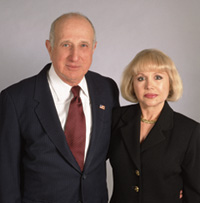About Bernard M. Gordon
 Bernard Marshall Gordon, (known as Bernie), was born in Springfield, Massachusetts, in 1927.At an early age he developed an interest in electronics. Upon graduation from Springfield’s TechnicalHigh School, he enlisted in the U.S. Navy and later became a commissioned officer. He earned B.S. and M.S. degrees in Electrical Engineering at the Massachusetts Institute of Technology via the U.S. Navy’s V-12 program and the GI Bill.
Bernard Marshall Gordon, (known as Bernie), was born in Springfield, Massachusetts, in 1927.At an early age he developed an interest in electronics. Upon graduation from Springfield’s TechnicalHigh School, he enlisted in the U.S. Navy and later became a commissioned officer. He earned B.S. and M.S. degrees in Electrical Engineering at the Massachusetts Institute of Technology via the U.S. Navy’s V-12 program and the GI Bill.
In 1947, Mr. Gordon began his technical career at Philco Corporation and later joined the Eckert-Mauchly Computer Corporation, where he was responsible for the development of the standard circuits, acoustic memory, supervisory control, and input/output circuits of the first commercial computer, UNIVAC I.
In the early 1950s, he joined the Laboratory for Electronics in Boston, Massachusetts, where he conceived and developed many pioneering inventions. Later, he and Joseph H. Davis founded EPSCO, Inc., where he developed the first high-precision, high-speed, analog-to-digital converters; the first music and video digitization systems; and the first fetal monitoring system.
In 1963, he founded Gordon Engineering, which later evolved into Analogic Corporation where he and the teams of engineers he led conceived and developed the first: digital waveform analyzing and computing instrumentation; “instant imaging” Computed Tomography (CT) system; portable, mobile CT scanner; and the first three-dimensional, multi-slice, dual-energy explosive detection CT system, among many other pioneering products.
In 2004, after leaving Analogic, he co-founded NeuroLogica Corporation of Danvers, Massachusetts, where he served and continues to serve as Chairman of the Board. Its first project was a portable imaging system, for neurological scanning applications, which would assist stroke and trauma victims
Elected to the National Academy of Engineering in 1991, Mr. Gordon has also received many awards, including that of Fellow of the IEEE; Fellow of the International Engineering Consortium; the IEEE Engineering Leadership Recognition Award; the Benjamin Franklin Award for Innovation in Engineering and Technology; the John Fluke, Sr., Memorial Award; and, in 1986, the U.S. National Medal of Technology, presented by the President of the United States.
Bernie is married to Sophia Delecari. Sophia was born in Piraeus, Greece, in 1931 and came to the United States, alone, as a teenager. Through the years, she has integrally and continually supported and nurtured Mr. Gordon’s endeavors andachievements.
Bernie and Sophia share philanthropic commitment to the education of engineering leaders. This passion has led to the establishment of the Gordon Institute, now part of Tufts University; the Gordon Professorships of Engineering Innovation and Practice at MIT; and the Bernard M. Gordon Prize at the National Academy of Engineering in Washington, D.C., an annual award of $500,000 recognizing contributions to engineering education innovation.
In 2004 the couple started donating to the Technion, the Israel Institute of Technology, aiming to promote systems engineering leadership in Israel. Their donation was used to establish the Gordon Center for Systems Engineering. This gift to The Technion resonates deeply with Mr. and Mrs, Gordon’s lifetime philanthropic commitment to the education of engineering leaders.

